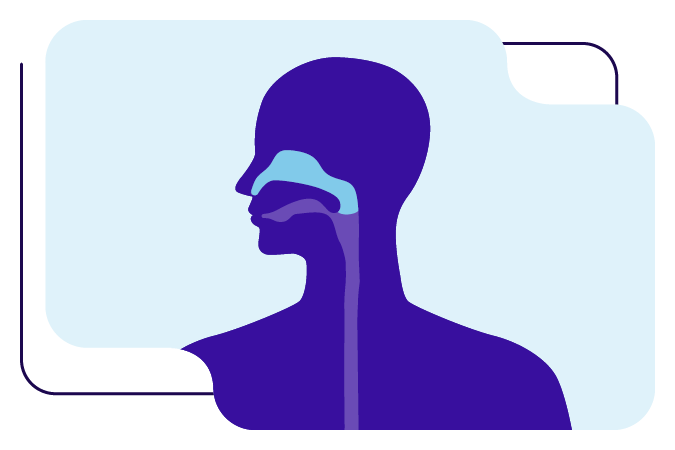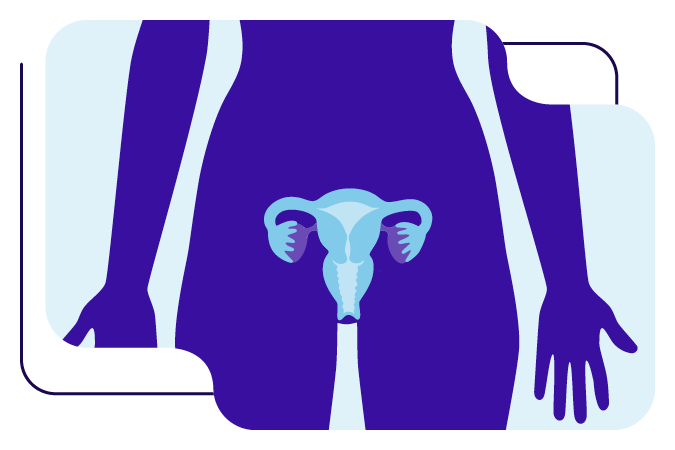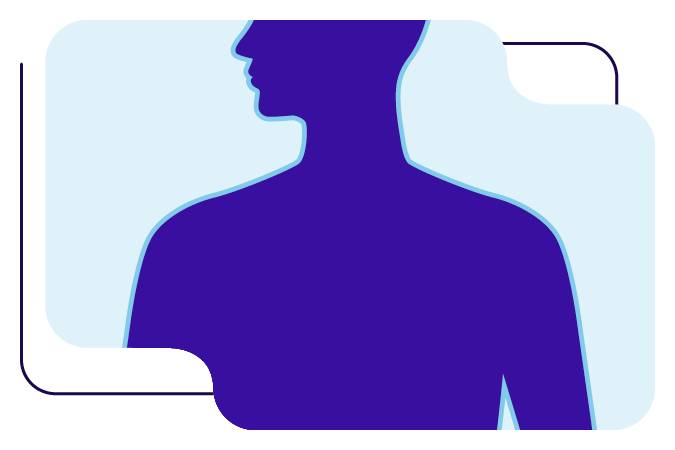Breast cancer
What is breast cancer? Find out how common it is, the causes, and expert advice on how to reduce your risk.
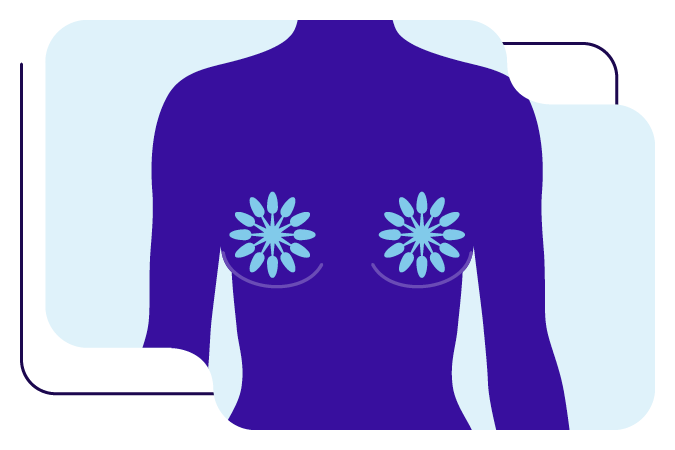
On this page
What is breast cancer?
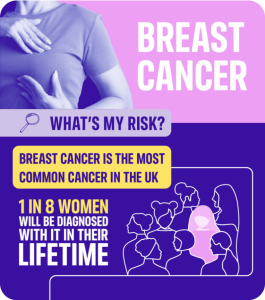 Breasts are made up of fatty tissue, glands that produce milk, and ducts that carry milk from the glands to the nipple.
Breasts are made up of fatty tissue, glands that produce milk, and ducts that carry milk from the glands to the nipple.
Breast tissue naturally develops in response to hormones at different stages of life – including during puberty, pregnancy and breastfeeding.
Breast cancer almost always develops in the glands or ducts that produce and carry milk.
Cancer develops when cells are damaged and then grow uncontrollably, forming a lump or thickening called a tumour.
Breast cancer in men is extremely rare. In 2021, there were approximately 400 cases across the UK.
How common is breast cancer?
Breast cancer is the most common cancer in the UK (2021 data), and the 2nd most common in the world (2022 data).
Breast cancer is the most common cancer in women globally.
| Region | Cases | Year |
|---|---|---|
| UK | 59,517 | 2021 |
| World | 2,296,840 | 2022 |
What are the signs and symptoms of breast cancer?
The symptoms of breast cancer can include:
- a lump or swelling in your breast, chest or armpit
- a change in the skin of your breast, such as dimpling or redness. These symptoms may be harder to see on black or brown skin
- a change in the size or shape of a breast
- nipple discharge, which may have blood in it
- a change in the shape or look of your nipple
- pain in your breast or armpit which does not go away
Find more information on breast cancer symptoms on the NHS website.
What causes breast cancer?
There are many different things that affect your risk of breast cancer.
Evidence for what can cause breast cancer comes from large population studies (called epidemiology) and biological studies (where scientists look at cells in a laboratory).
If the risk factors below affect you, this doesn’t necessarily mean that you will develop breast cancer.
Alcohol
Alcohol increases the risk of breast cancer.
Height
Being tall increases the risk of breast cancer.
Family history
The risk of breast cancer increases if a close relative has been diagnosed with breast cancer, particularly before the age of 50. Around 5% of breast cancer cases are genetic.
Menstrual cycles
The risk of breast cancer is affected by how many periods a woman has during her lifetime.
Not having children, having a first pregnancy after the age of 30, having your first period before the age of 12, and having the menopause after the age of 55 all increase the risk of breast cancer, because they all increase the number of menstrual cycles a woman has.
HRT
Taking combined hormone replacement therapy (HRT) slightly increases the risk of breast cancer the longer you take HRT, but gradually decreases once you stop. The evidence is less clear for oestrogen-only HRT.
Contraception
Oral contraceptives containing oestrogen and progesterone slightly increase the risk of breast cancer in young women. The risk gradually decreases when you stop taking the pill. The evidence is less clear for the mini pill.
Radiation
Radiation exposure from medical treatment such as X-rays, particularly during puberty, increases the risk of breast cancer, even at low doses.
Age
The risk of breast cancer increases with age.
Weight and breast cancer
The links between weight and breast cancer risk are complicated, and the evidence is different for pre-menopausal and post-menopausal breast cancer.
Pre-menopausal breast cancer:
- living with overweight or obesity in young adulthood (ages 18–30) decreases the risk of pre-menopausal breast cancer.
- living with overweight or obesity in adulthood before the menopause decreases the risk of pre-menopausal breast cancer.
- greater birthweight (babies who are born heavier) increases the risk of pre-menopausal breast cancer.
Post-menopausal breast cancer:
- living with overweight or obesity in young adulthood (ages 18–30) decreases the risk of post-menopausal breast cancer.
- living with overweight or obesity throughout adulthood increases the risk of post-menopausal breast cancer.
- weight gain in adulthood increases the risk of post-menopausal breast cancer.
How can living with overweight or obesity decrease your risk?
We don’t yet have a complete picture of how a woman’s weight across her life affects her breast cancer risk. Many factors may be at work such as:
- How weight affects the release of oestrogen in the body.
- How weight affects how many periods a woman has.
- How weight affects breast tissue, especially during puberty – we know that fatty breasts have a lower risk of breast cancer than dense breasts.
Being a healthy weight and avoiding weight gain throughout adulthood are important in reducing your risk of breast cancer after the menopause, which is the most common type of breast cancer, accounting for about 80 per cent of cases.
Even though the evidence on breast cancer is complex, we know that living with overweight and obesity increases the risk of many other cancers.
Our Cancer Prevention Recommendation is to be a healthy weight.
How to be a healthy weight
Reaching – and staying at – a healthy weight can reduce your risk of breast cancer, many other cancers, and other diseases.
But it’s not easy. Visit our weight and cancer page for more information about how weight affects the risk of developing cancer, and support to help you stay a healthy weight.
You can also read about how our Policy team encourage governments to make it easier for everyone to be a healthy weight.
What protects against breast cancer?
Physical activity
Any physical activity reduces the risk of post-menopausal breast cancer. Vigorous physical activity reduces the risk of pre-menopausal breast cancer.
Breastfeeding
Breastfeeding reduces the risk of breast cancer.
Menstrual cycles
The risk of breast cancer is affected by how many periods a woman has during her lifetime.
Having children before the age of 30, having your first period after the age of 12, and having the menopause before the age of 55 all decrease the risk of breast cancer, because they all decrease the number of menstrual cycles a woman has.
Other risk factors
We have some evidence that the following risk factors may affect the risk of breast cancer. However, the evidence for a link is less strong than the risk factors listed above.
There is some evidence that:
- non-starchy vegetables may decrease the risk of oestrogen-receptor-negative (ER–) breast cancer.
- food containing carotenoids may decrease the risk of breast cancer.
- diets high in calcium may decrease the risk of breast cancer.
- dairy products may decrease the risk of pre-menopausal breast cancer.
For scientists: full references, pathogenesis and a summary of the mechanisms underpinning our findings on how to prevent breast cancer can be found in our 2018 breast cancer report.
Reduce your risk of breast cancer
Following our Cancer Prevention Recommendations reduces your risk of breast cancer and other cancers. If you have been diagnosed with cancer, following our Recommendations can reduce the risk of cancer returning.
Don’t drink alcohol
Drinking alcohol is a cause of breast cancer – and other cancers. To reduce your risk of cancer, we recommend not drinking alcohol at all.
> Expert tips on reducing how much alcohol you drink
Be more active
Being physically active reduces your risk of breast cancer. We recommend at least 150 minutes of moderate intensity activity or 75 minutes of vigorous activity a week. The more active you are the better.
If you can, breastfeed your baby
Breastfeeding is good for your baby’s health and it can also help protect you against breast cancer.
What about screening?
The good news is that most breast cancer cases can be successfully treated if they are detected early – that’s why it is important to attend breast screening whenever you are invited.
Breast cancer survival
Our Living with cancer section can help if you are living with breast cancer.
Our former head of health information talks about breast cancer prevention
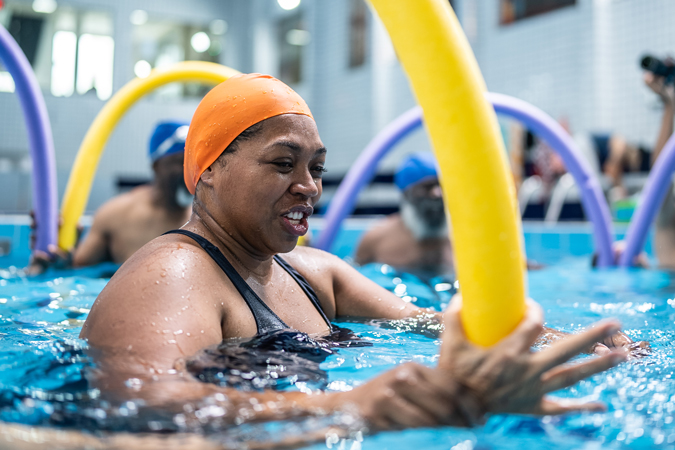
Women’s health guide
Find out the facts and stay in control of your health with our free booklet

What’s your cancer risk?
Answer a few simple questions to find out how your lifestyle could be making you attractive to cancer
